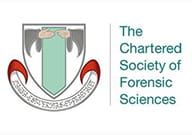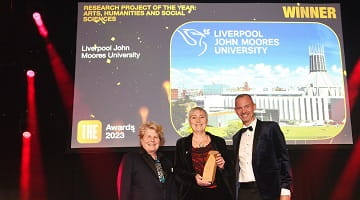2024/25 entry
BSc (Hons) Forensic Science
Clearing
Want to study with LJMU this September? Visit our Clearing hub to apply now if you have your grades or register your interest and become a Clearing Insider to receive updates while you wait for your results. Your journey starts with Clearing.
Minimum UCAS points required: TBC
Why study Forensic Science at Liverpool John Moores University?
- Opportunity to undertake a year's industrial placement
- Option to focus on biological or chemical aspects of analysis
- £6 million investment in teaching facilities, including specialist forensic analysis and scene-of-crime labs
- Opens up careers in the police, analytical laboratories, insurance or legal firms, independent forensic laboratories and the teaching sector
- Accredited by the Chartered Society of Forensic Sciences
- This degree is available to study following a foundation year
- International Foundation Year course available offering direct progression onto this degree programme - visit LJMU's International Study Centre to find out more
About your course
You will spend a large proportion of your time in the lab, carrying out drug spot tests, analysing fingerprints, processing crime scenes and analysing DNA while studying the BSc (Hons) Forensic Science at Liverpool John Moores University.
Over the past 50 years the analytical methods employed by forensic scientists have become very powerful indeed and have made a significant impact on conviction rates. Forensic science is all about using the power of scientific analysis to resolve legal disputes. It requires a sound knowledge of the analytical methods of biology and chemistry combined with training in crime scene investigation, as well as a basic knowledge of law and how to assess the value of evidence. You will be expected to have an attention to detail that is second to none for the microscopic analysis of hairs and fibres, DNA profiling and drug analysis.
This is a practical, hands-on course in which you will spend a large proportion of your time in the lab, carrying out spot tests for drugs, fingerprint and footwear analysis, crime scene processing, DNA analysis and forensic microscopy.
Throughout this professionally-accredited course you will be supported by our team of experts, with additional input from external speakers from all areas of forensics. There will also be plenty of opportunities for you to gain experience through work-based learning and/or on an optional sandwich placement.
"I enjoy the diversity of the course - one day you could be learning about biology and the next about mobile phone forensics, it's amazing!"
Professional accreditation/links
The BSc (Hons) Forensic Science degree is accredited by the Chartered Society of Forensic Sciences. Graduates are also eligible for associate membership of the Royal Society of Chemistry (AMRSC).

Fees and funding
There are many ways to fund study for home and international students
Fees
The fees quoted above cover registration, tuition, supervision, assessment and examinations as well as:
- Library membership with access to printed, multimedia and digital resources
- Access to programme-appropriate software
- Library and student IT support
- Free on-campus wifi via eduroam
Additional costs
Although not all of the following are compulsory/relevant, you should keep in mind the costs of:
- accommodation and living expenditure
- books (should you wish to have your own copies)
- printing, photocopying and stationery
- PC/laptop (should you prefer to purchase your own for independent study and online learning activities)
- mobile phone/tablet (to access online services)
- field trips (travel and activity costs)
- placements (travel expenses and living costs)
- student visas (international students only)
- study abroad opportunities (travel costs, accommodation, visas and immunisations)
- academic conferences (travel costs)
- professional-body membership
- graduation (gown hire etc)
Funding
There are many ways to fund study for home and international students. From loans to International Scholarships and subject-specific funding, you'll find all of the information you need on our specialist funding pages.
A DBS check is not required for your application, however a DBS may be required for modules where there is a work based learning placement option. Work based learning placements that do not require a DBS check are available.
Employability
Once you graduate with a BSc (Hons) in Forensic Science, you will be qualified to work in independent forensic analysis.
We have links with local police forces and forensic providers, which may provide work placements for LJMU students. Such connections ensure that the curriculum is constantly updated to meet the needs of employers. Graduates are qualified to work in forensic analysis, such as police scientific laboratories, independent forensic science providers, pharmaceutical companies, the chemical industry and hospital laboratories. You could be based in a variety of locations, such as a laboratory, office, in the field or on crime scenes. Trading standards, working for insurance companies, environmental monitoring and legal firms are other options.
Graduates from this course pursue careers in education at schools, colleges and universities and also progress to postgraduate study. Graduates are highly employable due to the transferable skills they acquire during their studies at LJMU.
Student Futures - Careers, Employability and Enterprise Service
A wide range of opportunities and support is available to you, within and beyond your course, to ensure our students experience a transformation in their career trajectory. Every undergraduate curriculum includes Future Focus during Level 4, an e-learning resource and workshop designed to help you to develop your talents, passion and purpose.
Every student has access to Careers Zone 24/7, LJMU's suite of online Apps, resources and jobs board via the LJMU Student Futures website. There are opportunities for flexible, paid and part-time work through Unitemps, LJMU's in-house recruitment service, and we also offer fully funded Discovery Internships.
One-to-one careers and employability advice is available via our campus-based Careers Zones and we offer a year-round programme of events, including themed careers and employability workshops, employer events and recruitment fairs. Our Start-Up Hub can help you to grow your enterprise skills and to research, plan and start your own business or become a freelancer.
A suite of learning experiences, services and opportunities is available to final year students to help ensure you leave with a great onward plan. You can access LJMU's Careers, Employability and Start-up Services after you graduate and return for one-to-one support for life.
Go abroad
LJMU aims to make international opportunities available to every student. You may be able to study abroad as part of your degree at one of our 100+ partner universities across the world. You could also complete a work placement or apply for one of our prestigious worldwide internship programmes. If you wanted to go abroad for a shorter amount of time, you could attend one of our 1-4 week long summer schools.
Our Go Citizen Scheme can help with costs towards volunteering, individual projects or unpaid placements anywhere in the world. With all of these opportunities at your feet, why wouldn’t you take up the chance to go abroad?
Find out more about the opportunities we have available via our Instagram @ljmuglobalopps or email us at: goabroad@ljmu.ac.uk.
A life-changing experience
There's so much more to university than just studying for a degree.
News and views
Browse through the latest stories and updates from the University and beyond
What you will study on this degree
Please see guidance below on core and option modules for further information on what you will study.
Further guidance on modules
Modules are designated core or optional in accordance with professional body requirements, as applicable, and LJMU’s Academic Framework Regulations. Whilst you are required to study core modules, optional modules provide you with an element of choice. Their availability may vary and will be subject to meeting minimum student numbers.
Where changes to modules are necessary these will be communicated as appropriate.
Level 5
Optional Modules
Conducting Investigations
20 credits
The module aims to develop your understanding of the legislative and policy framework which sets out the parameters for the investigation of criminal offences and provide the opportunity for you to demonstrate and explain investigative procedures through the use of case studies and crime scene practical's. It will also provide an opportunity to critically explore the range of regulatory processes and professional values which inform practice, theories of team work, communication, issues of professional status and power and working across organisational boundaries.
Teaching and work-related learning
Excellent facilities and learning resources
We adopt an active blended learning approach, meaning you will experience a combination of face-to-face and online learning during your time at LJMU. This enables you to experience a rich and diverse learning experience and engage fully with your studies. Our approach ensures that you can easily access support from your personal tutor, either by meeting them on-campus or via a video call to suit your needs.
Teaching is via a combination of lectures, interactive workshops, fieldwork, laboratory sessions, online activities and small-group tutorials; the amount of time you spend in each varies according to the module and the level of study.
You are expected to do additional research around lecture subjects in your own time using the University Libraries and virtual learning environment, Canvas. As the course progresses, the amount of practical and independent work increases, allowing you to develop workplace and research techniques and complete a research project.
Work-related learning
We have links with local police forces and forensic providers, who may provide work placement opportunities. With the support of a placement tutor, you may be given the opportunity to do paid work with one of our local police force or forensics lab contacts where you will put into practice skills and knowledge gained in your first two years of study.
As well as giving you a chance to develop personal skills and take a break from formal study, this experience will add real value to your CV and significantly boost your employability prospects.
Support and guidance
Dedicated personal tutor, plus study skills support
You will be allocated a personal tutor for the duration of your studies at LJMU. They will hold small tutorials so you can discuss course material with fellow students. In Level 6, an academic supervisor will advise and guide you through your research project.
Should you opt to spend a year on placement, a placement tutor will liaise between you and potential employers and help you to find a suitable post. Once you are settled in your placement, you will have regular support from an academic staff member who will visit you in your workplace to check on progress.
The school is fully committed to promoting a learning environment that supports a culture of equality, diversity and inclusivity (EDI) and has a Disability Support Coordinator, an EDI Coordinator and a School EDI Working Group. Personal Tutors also play a vital role in promoting awareness of support services for students.
Assessment
Assessment varies depending on the modules you choose, but will usually include a combination of exams and coursework.
We acknowledge that all students perform differently depending on the way they are assessed. This is why we use a range of assessment methods and a combination of exams and coursework for each module, though some practical modules are assessed by coursework only.
- Exams may include multiple choice, short answer, interpretative, problem-based learning and essay questions
- Coursework may be in the form of phase tests, fieldwork/practical reports, data handling, oral presentations, poster presentations, podcasts, online or real-time group discussions, essays or practical skills evaluations
Some assignments are done in groups. Your final year research project will be assessed by literature review and scientific report plus an oral presentation.
Feedback is normally provided within three weeks of submission and may be via Canvas, face-to-face or as written comments. This is a vital part of the assessment process, as it gives you a chance to identify your successes and areas that may need further attention.
Course tutors
Our staff are committed to the highest standards of teaching and learning
Dr Helen Burrell
Programme Leader
Dr Burrell has worked at LJMU since 2007 and is involved in all aspects of the programme, including module leadership, level tutoring and programme leadership. Her PhD is in Cell Biology and she has also completed postdoctoral work on cardiomyocytes, as well as stem cells. She has written a number of book chapters within the Biochemistry area. Dr Burrell's research interests are in ATP signalling - particularly in the skin and how it controls proliferation, differentiation and cell death. Her other focus in the forensic world is on the implementation of new technology in forensic science, such as how to un-smudge fingerprints.
Teaching is highly rewarding for me, particularly when a student has that 'lightbulb' moment when they suddenly realise they can do it with a little hard work and perseverance
Facilities
What you can expect from your School
You will study at the Byrom Street site in the university's City Campus in the heart of Liverpool. Our state-of-the-art laboratories and teaching spaces will ensure you enjoy a first-class study environment. The Avril Robarts library is within easy walking distance and here you'll find all the information you need to support your studies.
The university reserves the right to withdraw or make alterations to a course and facilities if necessary; this may be because such changes are deemed to be beneficial to students, are minor in nature and unlikely to impact negatively upon students or become necessary due to circumstances beyond the control of the university. Where this does happen, the university operates a policy of consultation, advice and support to all enrolled students affected by the proposed change to their course or module.
Further information on the terms and conditions of any offer made, our admissions policy and the complaints and appeals process.












